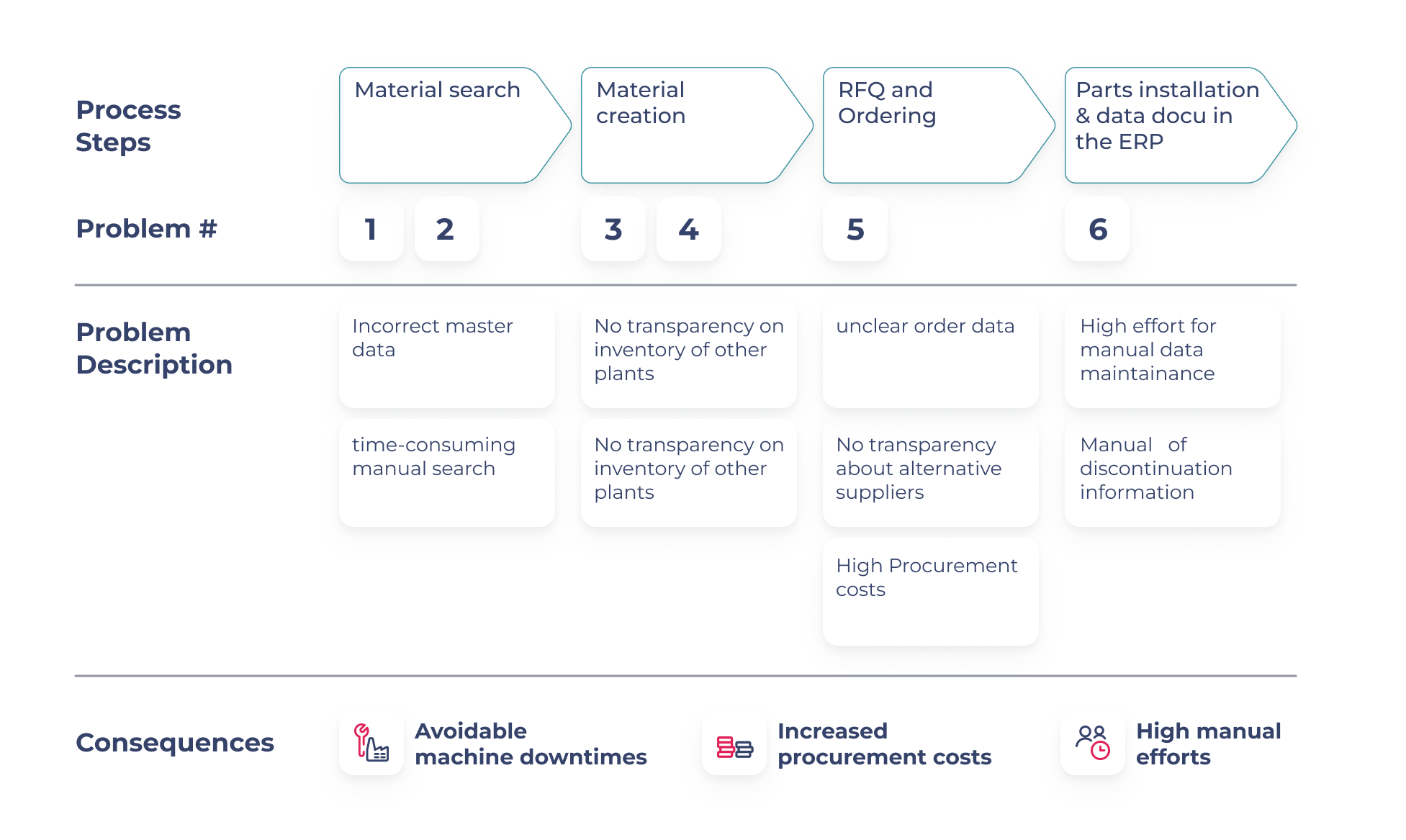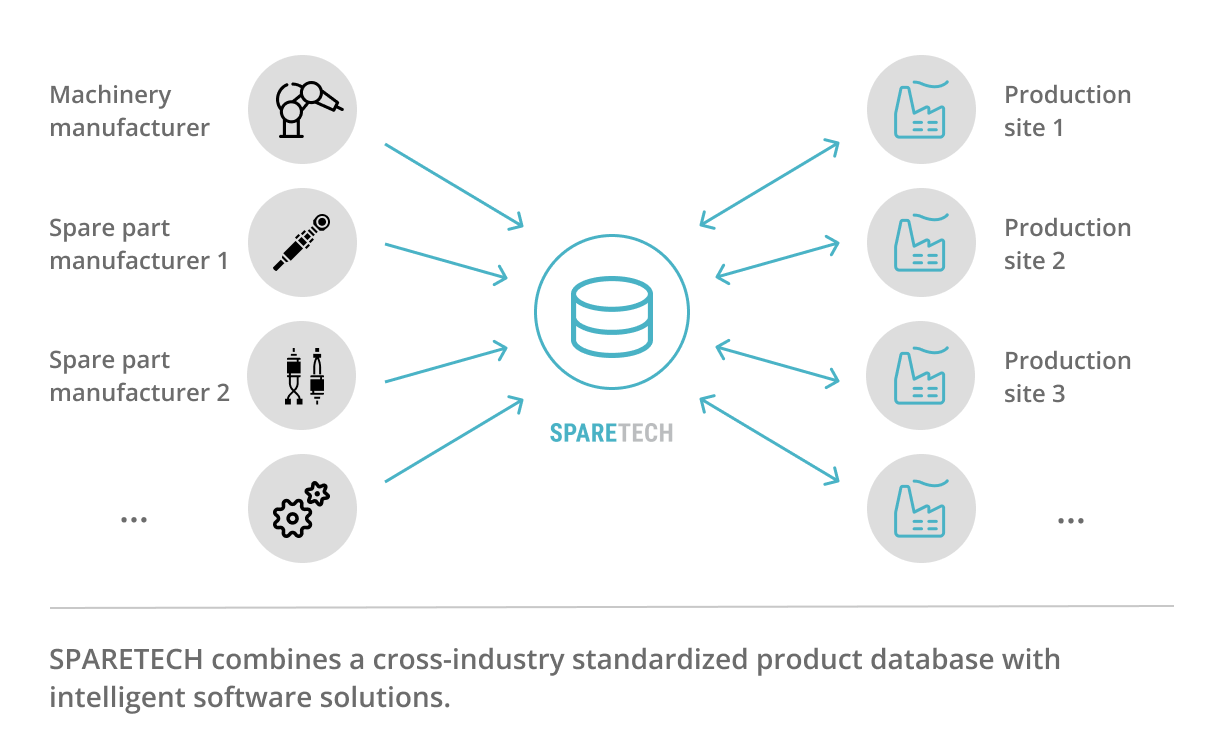Management summary
SPARETECH succeeds in digital innovation for industrial spare parts management. By using intelligent software and modern algorithms, SPARETECH is the first provider that can automatically identify faulty master data of its customers and update it with the correct information from the original spare parts manufacturer. This not only increases plant availability and saves costs, but also reduces inventories in the production network by up to 25%.
The eternal spare parts dilemma
A plant malfunction occurs - a daily reality in every manufacturing company. If the machine failure is due to a defective component, for example a light sensor or a hydraulic cylinder, this part is replaced as quickly as possible to restore the plant. This is only possible if the required spare part is in stock. Because of the enormous variety of spare and wear parts, it is both physically (storage space) and economically (inventory management costs) impossible to keep all parts for the entire machinery in stock. It therefore becomes precarious when the urgently needed spare part is not in stock. This costs time and money.
In individual cases, an unforeseeable machine failure can cost hundreds of thousands of euros, if not more. In an average automotive production plant, up to €15 million is incurred annually in this way. Cost premiums for the short-term procurement of critical parts are accepted in order to keep the machine downtime costs low.
Today's market for industrial spare parts management is characterized by isolated stand-alone solutions. Machine manufacturers are trying to gain direct access to the customer's system through networked systems and to trigger automatic orders (in the sense of predictive maintenance). Today, the after-sales business is the largest revenue component of machine and plant manufacturers, accounting for 50-60%. The problem here is that plant operators work with several machine manufacturers and thus no longer have any transparency regarding common parts in their machinery. In addition, operators fall victim to the agency problem, as they have no way to transparently compare prices for the spare parts they need. In addition to prices, this leads to excessive inventories, high inventory management costs, and above-average capital lockup. Figure 1 illustrates the problem.

Figure 1: Isolated spare parts management today
The consequences of poor spare parts availability can be summarized as follows:
- High procurement costs for (short-term) spare parts orders
- High manual personnel expenditure for warehouse and master data management
- High inventory and capital commitment costs, as the easiest solution to conceal availability problems is to accumulate spare parts inventories
Does it have to be that way? No.
By using intelligent software, SPARETECH.io offers for the first time a solution to the availability problem of spare parts for machines and plants. The basis for this is
SPARETECH's cross-industry and independent product database for machine spare parts. By using unique software and modern algorithms, SPARETECH is able to identify faulty master data of its customers and to provide the "correct" information of the original spare parts manufacturer. This not only increases plant availability and saves costs, but also reduces inventories in the production network by up to 25%.
Cause analysis first
Before sketching the solution, however, it is important to identify the actual causes of the problem. These can be illustrated along a typical spare parts management process (Figure 2).

Figure 2: Causes of problems in the spare parts management process
Problem causes 1-4: Manual data maintenance in the ERP system
Suppose a spare part is needed due to a failure or the announcement of a failure (quality problem). To resolve this condition, the responsible maintenance employee goes to the ERP system to search for the spare part, but is unable to find it. There may be various reasons for this:
- The part has never been created and ordered in the system
- The part was created incorrectly (e.g. typing error in article number or type designation)
- The employee's search is incorrect (wrong article number entered in search field)
- No transparency as to which parts, if any, are available in the company's own production network
For all four causes, the human being is the potential source of error, or in the first case, the bottleneck: the fact that not all parts information (parts list) is initially transferred to the ERP system when a new machine is purchased is simply due to the fact that this would take several weeks or months if created manually (by a human being) - and is prone to errors.
If the required spare part cannot be found in the system, the new creation and first order is made. If it has been created incorrectly, stock levels without turnover ("zero turn") are to be expected and an unnecessarily overcrowded warehouse, as part numbers are physically stored that no longer have any consumption.
Causes of problems 5 and 6: No transparency as to where the spare part can be obtained as quickly and cost-effectively as possible
Once the spare part has been created, the question arises as to where it can be obtained as quickly and cost-effectively as possible. There is no overarching solution on the market today that offers this transparency. Manual searches via Internet platforms such as Google, Bing, (o.a.) are time-consuming and predominantly provide technical product information from the spare parts manufacturer or equipment vendor. In addition, it is difficult to assume low-cost products here, as the vendors that rank highest are those that do the best SEO or pay the most money for ads.
The customer only receives a binding offer via the countless customer portals of the manufacturers or by calling customer service. This process is time-consuming, which costs time and money unnecessarily, especially in the event of an unplanned malfunction. A marketplace similar to Amazon or ebay for industrial spare parts management does not exist today.
Another problem is that no cross-site information on spare parts availability is exchanged within a group of companies. Often, this is not due to a lack of will to cooperate, but to hurdles on the IT side. To make matters worse, poor master data quality among all the players involved in the production network frustrates any collaboration efforts. Network scale effects simply cannot be realized because the data cannot be made available and, moreover, are not comparable and are sometimes incorrect.
From this, the following causes can be summarized:
- No (price) transparency along existing suppliers of spare parts (alternatives), and thus high procurement costs
- Low master data quality (e.g. duplicate and triple part numbers are stored in the ERP system; incorrect entries)
- There is no spare parts collaboration platform to realize economies of scale in the production network.
SPARETECH.io as a solution
In order to revolutionize industrial spare parts management, the Stuttgart-based company SPARETECH GmbH has set itself the task of solving the causes of the problems identified above.
SPARETECH has the largest, cross-industry and independent product database for machine spare parts. By using intelligent as well as unique software and modern algorithms, SPARETECH is able to identify incorrect master data of its customers and provide the "correct" information from the original spare parts manufacturer. To make this possible, customers can upload their ERP master data in their private SPARETECH account and have it checked for errors. In addition, all parts lists of all assets in the machine park can be uploaded and generated as an export file by the SPARETECH matching algorithm in the desired ERP format. At the same time, duplicates are detected so that the result is an error-free "digital twin" without redundant master data. In this way, SPARETECH becomes an enabler for any digitization projects and a firm partner on the path to Industry 4.0.
If SPARETECH accounts are linked within a production network, in the event of a malfunction it can be seen at which location the required spare part is basically managed in the ERP system. An exchange with colleagues is sufficient to find out whether the spare part can be made available quickly. In this way, economies of scale can be realized within the company's own network. And in the case of cross-company collaboration, also beyond. Figure 3 illustrates the solution model.

Figure 3: The SPARETECH solution
In addition, the SPARETECH team is working on a marketplace solution so that customers from a wide range of industries can compare different procurement options for machine spare parts needed at short notice. It also offers the chance to sell old spare parts that are still physically stored but no longer needed to potential buyers. A mixture of Amazon and ebay, so to speak, for industrial spare parts management.
Contact us now to get your free demo access.
We look forward to working with you.
Your SPARETECH team




